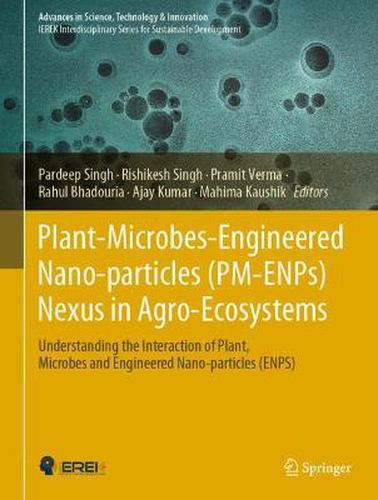Readings Newsletter
Become a Readings Member to make your shopping experience even easier.
Sign in or sign up for free!
You’re not far away from qualifying for FREE standard shipping within Australia
You’ve qualified for FREE standard shipping within Australia
The cart is loading…






This book presents a collection of cross-disciplinary research, with contributions addressing all key features of the plant/microbe/ENP nexus in agro-ecosystems. The uptake, transport and transformation of nanoparticles in plants have attracted more and more attention in the past several years. Especially, the impact of Engineered Nanoparticles (ENPs) on bioprocesses; low-, medium- and high-level dose responses in the microbial community of soil; and long-, medium- and short-term exposure responses, particularly microbial nitrogen transformations, are just a few of the aspects involved. Since ENPs are used in many industries, including cosmetics, agriculture, medicine, food technology and waste management, their transport through biogeochemical cycles is an important focus of many studies today. Specifically, ENP-microbe interaction has been analysed with regard to disease treatment for plants; it plays a vital role in disease inhibition by releasing metal ions that act through many pathways - e.g. reactive oxygen species (ROS) generation, DNA transformation and disruption of the cell cycle - to stop cell growth in the pathogen. Due to these properties, ENPs are also used as slow release or delayed release pesticides and fungicides, and as carrier systems for growth-promoting hormones. Despite their multiple uses in various industries, the negative effects of ENPs are still a major concern for the scientific community and consumers alike. For example, their transport to various food chains has been reported to have adverse effects. This raises a degree of doubt concerning a rapidly growing scientific field with major applications in many industries. From a sustainable development perspective and particularly to ensure food security in light of the uncertainty accompanying climate change, it is imperative to address this divergence by focusing on the plant/microbe/ENP nexus.
$9.00 standard shipping within Australia
FREE standard shipping within Australia for orders over $100.00
Express & International shipping calculated at checkout
This book presents a collection of cross-disciplinary research, with contributions addressing all key features of the plant/microbe/ENP nexus in agro-ecosystems. The uptake, transport and transformation of nanoparticles in plants have attracted more and more attention in the past several years. Especially, the impact of Engineered Nanoparticles (ENPs) on bioprocesses; low-, medium- and high-level dose responses in the microbial community of soil; and long-, medium- and short-term exposure responses, particularly microbial nitrogen transformations, are just a few of the aspects involved. Since ENPs are used in many industries, including cosmetics, agriculture, medicine, food technology and waste management, their transport through biogeochemical cycles is an important focus of many studies today. Specifically, ENP-microbe interaction has been analysed with regard to disease treatment for plants; it plays a vital role in disease inhibition by releasing metal ions that act through many pathways - e.g. reactive oxygen species (ROS) generation, DNA transformation and disruption of the cell cycle - to stop cell growth in the pathogen. Due to these properties, ENPs are also used as slow release or delayed release pesticides and fungicides, and as carrier systems for growth-promoting hormones. Despite their multiple uses in various industries, the negative effects of ENPs are still a major concern for the scientific community and consumers alike. For example, their transport to various food chains has been reported to have adverse effects. This raises a degree of doubt concerning a rapidly growing scientific field with major applications in many industries. From a sustainable development perspective and particularly to ensure food security in light of the uncertainty accompanying climate change, it is imperative to address this divergence by focusing on the plant/microbe/ENP nexus.